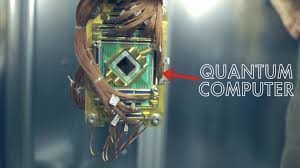Source – forbes.com
We produce 2.5 exabytes of data every day. That’s equivalent to 250,000 Libraries of Congress or the content of 5 million laptops. Every minute of every day 3.2 billion global internet users continue to feed the data banks with 9,722 pins on Pinterest, 347,222 tweets, 4.2 million Facebook likes plus ALL the other data we create by taking pictures and videos, saving documents, opening accounts and more.
We are at the limits of the data processing power of traditional computers and the data just keeps growing. While Moore’s Law, which predicts the number of transistors on integrated circuits will double every two years, proved remarkably resilient since the term was coined in 1965, those transistors are now as small as we can make them with existing technology. That’s why there’s a race from the biggest leaders in the industry to be the first to launch a viable quantum computer that would be exponentially more powerful than today’s computers to process all the data we generate every single day and solve increasingly complex problems.
Quantum Computers Solve Complex Problems Quickly
Once one of these industry leaders succeed at producing a commercially viable quantum computer, it’s quite possible that these quantum computers will be able to complete calculations within seconds that would take today’s computers thousands of years to calculate. Today, Google has a quantum computer they claim is 100 million times faster than any of today’s systems. That will be critical if we are going to be able to process the monumental amount of data we generate and solve very complex problems. The key to success is to translate our real-world problems into quantum language.
The complexity and size of our data sets are growing faster than our computing resources and therefore place considerable strain on our computing fabric. While today’s computers struggle or are unable to solve some problems, these same problems are expected to be solved in seconds through the power of quantum computing. It’s predicted that artificial intelligence, and in particular machine learning, can benefit from advances in quantum computing technology, and will continue to do so, even before a full quantum computing solution is available. Quantum computing algorithms allow us to enhance what’s already possible with machine learning.
Quantum Computers Will Optimize Solutions
Another way quantum computing will facilitate a revolution will be in our ability to sample the data and optimize all kinds of problems we encounter from portfolio analysis to the best delivery routes and even help determine what the optimal treatment and medicine protocol is for every individual.
We are at a point with the growth of big data that we have changed our computer architecture which necessitates the need for a different computational approach to handling big data. Not only is it larger in scope, but the problems we’re trying to solve are very different. Quantum computers are better equipped to solve sequential problems efficiently. The power they give businesses and even consumers to make better decisions might just be what’s needed to convince companies to invest in the new technology when it becomes available.
Bernard Marr is a best-selling author & keynote speaker on business, technology and big data. His new book is Data Strategy. To read his future posts simply join his network here.
